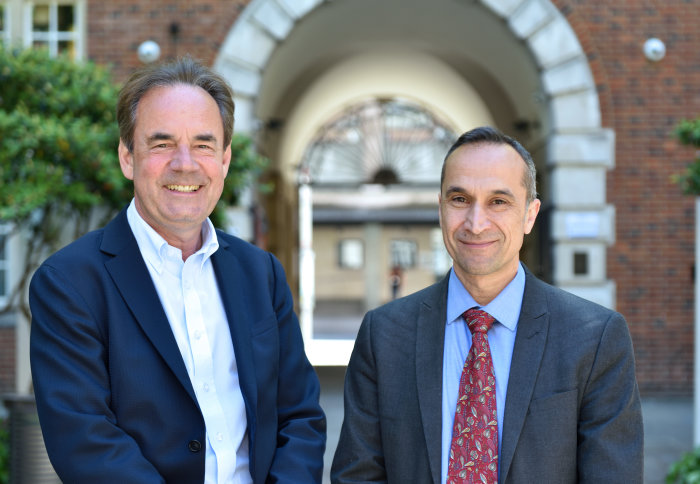Donation supports frontier research and scholarships in Chemical Engineering
by Daniel Mapp

Mr Mark Richardson (left) with Professor Nilay Shah, Head of the Department of Chemical Engineering.
A generous gift from Mark Richardson (Chemical Engineering 1976, Management Science 1977) will advance priority research and support students in need.
Seven research projects aiming to reduce the environmental footprint of industrial processes will be supported by Mr Richardson’s generous donation, which Imperial announced this week.
The gift, which is the largest single donation ever made to the Department of Chemical Engineering, will be used to provide additional research capacity through support of PhD students and postdoctoral researchers and specialist research equipment.
The projects to be supported by Mr Richardson’s donation are early-stage, blue-skies research ideas which, despite their potential for impact, might be seen as too ‘risky’ by conventional researcher funders.
One such project is a four-year initiative to develop new energy-efficient methods for chemical separations. Currently, 10–15% of global energy consumption is attributable to distillation and evaporation in the oil, gas and chemicals industry. Imperial researchers are developing a low-energy alternative method, which uses polymer membranes that are nanoengineered to allow specified substances to pass through. Mr Richardson’s gift will enable the most promising membranes to be scaled up to pilot stage.
Other projects to be supported include: a study into low-carbon production of iron; exploring a novel process to make use of the biomass residue left after bioethanol production; developing innovative methods for removing pollutants from waste water using novel ionic liquid-based sorbents; synthesising new green detergents from renewable sources; experimental studies to improve the efficiency of hydrogen production and CO2 capture; and testing a lower-energy process for producing hydrogen from glycerol, rather than water.
A portion of Mr Richardson’s gift will also be used to provide scholarships for chemical engineering undergraduates, as part of a wider initiative by the Department to encourage applications by students from under-represented groups. His gift will provide scholarships for fifteen students, for the full duration of their four-year course, as well as providing a permanent endowment fund for a number of scholarships in the future.
Professor Alice Gast, President of Imperial said: “We are deeply grateful to Mark for his exceptional support of research and education. This gift has already inspired bold new research initiatives that might otherwise not be pursued and his support of scholarships will encourage talented students to apply to Imperial, regardless of their financial circumstances.”
“This gift has already inspired bold new research initiatives that might otherwise not be pursued.” Professor Alice Gast President
Professor Nilay Shah, Head of the Department of Chemical Engineering said: “We are sincerely grateful to Mark. His gift will have profound and long-lasting impact, both through the research it enables, and through the scholarship opportunities it creates. His philanthropic vision is inspiring, and we are honoured by his interest in, and friendship to, the Department.”
Mr Richardson said: “Being able to support research at my old university is a great privilege, and I look forward to hearing about the research team’s discoveries in the years ahead. Supporting the next generation of chemical engineers is a personal priority for me, so I am thrilled to make a contribution to the Department’s scholarship programme for students from under-represented groups.”
Article text (excluding photos or graphics) © Imperial College London.
Photos and graphics subject to third party copyright used with permission or © Imperial College London.
Reporter
Daniel Mapp
Advancement